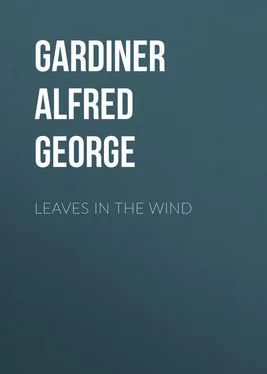Alfred Gardiner - Leaves in the Wind
Здесь есть возможность читать онлайн «Alfred Gardiner - Leaves in the Wind» — ознакомительный отрывок электронной книги совершенно бесплатно, а после прочтения отрывка купить полную версию. В некоторых случаях можно слушать аудио, скачать через торрент в формате fb2 и присутствует краткое содержание. Жанр: История, foreign_antique, foreign_prose, на английском языке. Описание произведения, (предисловие) а так же отзывы посетителей доступны на портале библиотеки ЛибКат.
- Название:Leaves in the Wind
- Автор:
- Жанр:
- Год:неизвестен
- ISBN:нет данных
- Рейтинг книги:5 / 5. Голосов: 1
-
Избранное:Добавить в избранное
- Отзывы:
-
Ваша оценка:
- 100
- 1
- 2
- 3
- 4
- 5
Leaves in the Wind: краткое содержание, описание и аннотация
Предлагаем к чтению аннотацию, описание, краткое содержание или предисловие (зависит от того, что написал сам автор книги «Leaves in the Wind»). Если вы не нашли необходимую информацию о книге — напишите в комментариях, мы постараемся отыскать её.
Leaves in the Wind — читать онлайн ознакомительный отрывок
Ниже представлен текст книги, разбитый по страницам. Система сохранения места последней прочитанной страницы, позволяет с удобством читать онлайн бесплатно книгу «Leaves in the Wind», без необходимости каждый раз заново искать на чём Вы остановились. Поставьте закладку, и сможете в любой момент перейти на страницу, на которой закончили чтение.
Интервал:
Закладка:
I have never been able to fathom the obduracy of women in this matter of pockets. It is not the only reflection upon their common-sense which is implicit in their dress. If we were to pass judgment on the relative intelligence of the sexes by their codes of costume, sanity would pronounce overwhelmingly in favour of men. Imagine a man who buttoned his coat and waistcoat down the back, so that he was dependent on someone else to help dress him in the morning and unfasten him at night, or who relied on such abominations as hooks-and-eyes scattered over unattainable places, in order to keep his garments in position. You cannot imagine such a man. Yet women submit to these incredible tyrannies of fashion without a murmur, and talk about them as though it was the hand of fate upon them. I have a good deal of sympathy with the view of a friend of mine who says that no woman ought to have a vote until she has won the enfranchisement of her own buttons.
Or take high-heeled boots. Is there any sight more ludicrous than the spectacle of a woman stumbling along on a pair of high heels, flung out of the perpendicular and painfully struggling to preserve her equilibrium, condemned to take finicking little steps lest she should topple over, all the grace and freedom of movement lost in an ugly acrobatic feat? And when the feet turn in, and the high heels turn over – heavens! I confess I never see high heels without looking for a mindless face, and I rarely look in vain.
But the puzzle about the pockets is that quite sensible women go about in a pocketless condition. I turned to Jane just now – she was sitting by the fire knitting – and asked how many pockets she had when she was fully dressed. "None," she said. "Pockets haven't been worn for years and years, but now they are coming in – in an ornamental way." "In an ornamental way?" said I. "Won't they carry anything?" "Well, you can trust a handkerchief to them." "Not a purse?" "Good gracious, no. It would simply ask to be stolen, and if it wasn't stolen in five minutes it would fall out in ten." The case was stranger than I had thought. Not to have pockets was bad enough; but to have sham pockets! Think of it! We have been at war for three and a half years, and women are now beginning to wear pockets "in an ornamental way," not for use but as a pretty fal-lal, much as they might put on another row of useless buttons to button nothing. And what is the result? Jane (I have full permission to mention her in order to give actuality to this moral discourse) spends hours looking for her glasses, for her keys, for the letter that came this morning, for her purse, for her bag, for all that is hers. And we, the devoted members of the family, spend hours in looking for them too, exploring dark corners, probing the interstices of sofas and chairs, rummaging the dishevelled drawers anew, discovering the thing that disappeared so mysteriously last week or last month and that we no longer want, but rarely the article that is the very hub of the immediate wheel of things.
Now, I am different. I am pockets all over. I am simply agape with pockets. I am like a pillar-box walking about, waiting for the postman to come and collect things. All told, I carry sixteen pockets – none of them ornamental, every one as practical as a time-table – pockets for letters, for watch, for keys, for handkerchiefs, for tickets, for spectacles (two pairs, long and short distance), for loose money, for note-wallet, for diary and pocket-book – why, bless me, you can hardly mention a thing I haven't a pocket for. And I would not do without one of them, madam – not one. Do I ever lose things? Of course I lose things. I lose them in my pockets. You can't possibly have as many pockets as I have got without losing things in them. But then you have them all the time.
That is the splendid thing about losing your property in your own pockets. It always turns up in the end, and that lady's satchel left on the counter will never turn up. And think of the surprises you get when rummaging in your pockets – the letters you haven't answered, the bills you haven't paid, the odd money that has somehow got into the wrong pocket. When I have nothing else to do I just search my pockets – all my pockets, those in the brown suit, and the grey suit, and the serge suit, and my "Sunday best" – there must be fifty pockets in all, and every one of them full of something, of ghosts of engagements I haven't kept, and duties I haven't performed, and friends I have neglected, of pipes that I have mourned as lost, and half packets of cigarettes that by some miracle I have not smoked, and all the litter of a casual and disorderly life. I would not part with these secrecies for all the satchels in Oxford Street. I am my own book of mysteries. I bulge with mysteries. I can surprise myself at any moment I like by simply exploring my pockets. If I avoid exploring them I know I am not very well. I know I am not in a condition to face the things that I might find there. I just leave them there till I am stronger – not lost, madam, as they would be in your satchel, but just forgotten, comfortably forgotten. Why should one always be disturbing the sleeping dogs in the kennels of one's pockets? Why not let them sleep? Are there not enough troubles in life that one must go seeking them in one's own pockets? And I have a precedent, look you. Did not Napoleon say that if you did not look at your letters for a fortnight you generally found that they had answered themselves?
And may I not in this connection recall the practice of Sir Andrew Clarke, the physician of Mr. Gladstone, as recorded in the reminiscences of Mr. Henry Holiday? At dinner one night Sir Andrew was observed to be drinking champagne, and was asked why he allowed himself an indulgence which he so rigorously denied to his patients. "Yes," he said, "but you do not understand my case. When I go from here I shall find a pile of fifty or sixty letters awaiting answers." "But will champagne help you to answer them?" asked the other. "Not at all," said Sir Andrew, "not at all; but it puts you in the frame of mind in which you don't care a damn whether they are answered or not." I do not offer this story for the imitation of youth, but for the solace of the people like myself who have long reached the years of discretion without becoming discreet, and who like to feel that their weaknesses have been shared by the eminent and the wise.
And, to conclude, the wisdom of the pocket habit is not to be judged by its abuse, but by its obvious convenience and safety. I trust that some energetic woman will be moved to inaugurate a crusade for the redemption of her sex from its pocketless condition. A Society for the Propagation of Pockets Among Women (S.P.P.A.W.) is a real need of the time. It should be a part of the great work of after-the-war reconstruction. It should organise opinion, distribute leaflets and hold meetings, with the Mayor in the chair and experts, rich in pockets and the lore of the subject, to light the fire of rebellion throughout the land. Women have won the vote from the tyrant man. Let them win their pockets from the tyrant dressmaker.
ON A COUNTRY PLATFORM
The fields lie cheek-by-jowl with the station, and a group of high elms, in which dwells a colony of rooks, throws its ample shade over the "down" platform.
From the cornfield that marches side by side with the station there comes the cheerful music of the reaper and the sound of the voices of the harvesters, old men, some women and more children – for half of the field has been reaped and is being gathered and gleaned. They are so near that the engine-driver of the "local" train exchanges gossip with them in the intervals of oiling his engine. They talk of the crops and the bad weather there has been and the change that has come with September, and the news of boys who are fighting or have fallen…
Читать дальшеИнтервал:
Закладка:
Похожие книги на «Leaves in the Wind»
Представляем Вашему вниманию похожие книги на «Leaves in the Wind» списком для выбора. Мы отобрали схожую по названию и смыслу литературу в надежде предоставить читателям больше вариантов отыскать новые, интересные, ещё непрочитанные произведения.
Обсуждение, отзывы о книге «Leaves in the Wind» и просто собственные мнения читателей. Оставьте ваши комментарии, напишите, что Вы думаете о произведении, его смысле или главных героях. Укажите что конкретно понравилось, а что нет, и почему Вы так считаете.












